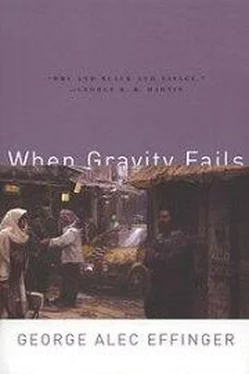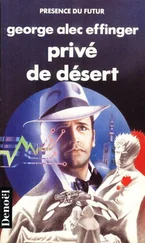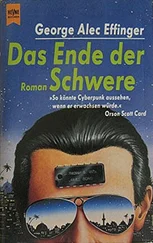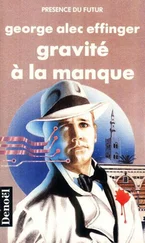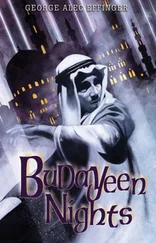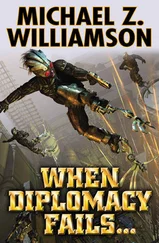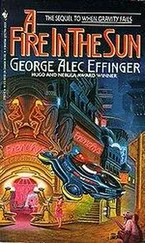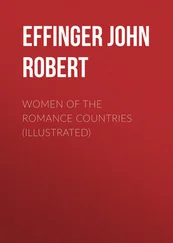His brown eyes caught mine and held them. “How is your health?” he asked. His voice was unfriendly.
“Praise Allah,” I said. I felt the fear growing.
“We have not seen you in some time,” said Friedlander Bey. “You have made us lonely.”
“May Allah never let you feel lonely.”
The second Stone served coffee. Papa took a cup and sipped from it to show me it wasn’t poisoned. Then he handed it to me. “Be pleased,” he said. There was little hospitality in his voice.
I took the cup. “May coffee be found forever in your house.”
We drank some coffee together. Papa sat back and regarded me for a moment. “You have honored us,” he said at last.
“May Allah preserve you.” We had come to the end of the short form of the amenities. Things would begin to happen now. The first thing that happened was that I took out my pill case, dug up every tranquilizer I could find, and swallowed them with some more coffee. I took fourteen Paxium; some people would find that a large quantity. It wasn’t, for me. I know lots of people in the Budayeen who can drink me under the table — Yasmin, for one — but I bow to no one in my capacity for pills and caps. Fourteen 10-milligram Paxium, if I was lucky, would only unscrew the tension a little; they wouldn’t even begin to make me really tranquil. Right then, I’d need something with a little more velocity to it for that. Fourteen Paxium was barely Mach 1.
Friedlander Bey held out his coffee cup to his servant, who refilled it. Papa sipped a little of it, watching me over the rim of the small cup. He set it down precisely and said, “You understand that I have a great number of people in my employ.”
“Indeed yes, O Shaykh,” I said.
“A great number of people who depend on me, not only for their livelihoods, but for much more. I am a source of security in their difficult world. They know that they may depend on me for wages and certain favors, as long as they perform their work for me in a satisfactory way.”
“Yes, O Shaykh.” The blood drying on my face and arms irritated me.
He nodded. “So when I learn that one of my friends has, indeed, been welcomed by Allah into Paradise, I am distressed. I am concerned for the well-being of all who represent me in the city, from my trusted lieutenants down to the poorest and most insignificant beggar who aids me however he can.”
“You are the people’s shield against calamity, O Shaykh.”
He waved a hand, tired of my interruptions. “Death is one thing, my nephew. Death comes to all, there is no one who can run from it. The jar cannot remain whole forever. We must learn to accept our eventual demise; and more, we must look forward to our eternal delight and refreshment in Paradise. Yet death before death is due is unnatural. That is another thing completely; it is an affront to Allah, and must be set right. One cannot recall the dead to life, but one can avenge a murder. Do you understand me?”
“Yes, O Shaykh.” It hadn’t taken Friedlander Bey long to hear about Courvoisier Sonny’s premature end. Nassir probably called Papa even before he called the police.
“Then, let me put this question to you: How does one revenge a murder?”
There was a long, glacial silence. There was only one answer, but I took a while to frame my reply in my mind. “O Shaykh,” I said at last, “a death must be met with another death. That is the only revenge. It is written in the Straight Path, ‘Retaliation is prescribed for you in the matter of the murdered’; and also, ‘One who attacketh you, attack him in like manner as he attacked you.’ But it also says elsewhere, ‘The life for the life, and the eye for the eye, and the nose for the nose, and the ear for the ear, and the tooth for the tooth, and for wounds retaliation. But whoso forgoeth it in the way of charity, it shall be expiation for him.’ I am innocent of this murder, O Shaykh, and to seek revenge wrongfully is a crime worse than the killing itself.”
“Allah is Most Great,” murmured Papa. He looked at me in surprise. “I had heard that you were an infidel, my nephew, and it caused me pain. Yet you have a certain knowledge of the noble Qur’ân.” He stood up from the table and rubbed his forehead with his right hand. Then he crossed to the large bed and laid down on the bedspread. I turned to face him, but a huge brown hand clamped itself on my shoulder and forced me to turn around again. I could only stare across the table, at Friedlander Bey’s empty chair. I could not see him, but I could hear him when he spoke. “I have been told that of all people in the Budayeen, you had most reason to want to murder this man.”
I thought back over the recent months; I couldn’t even remember the last time I’d even said hello to Sonny. I stayed out of the Red Light; I had nothing to do with the kind of debs, changes, and girls Sonny ran on the street; our circles of friends didn’t seem to intersect at all, except for Fuad il-Manhous — and Fuad was no friend of mine and, I’m sure, no friend of Sonny’s, either. Yet the Arab’s concept of revenge is as fully developed and patient as the Sicilian’s. Maybe Papa was thinking of some incident that had happened months, even years, ago, something I had forgotten completely, that could be construed as a motive to kill Sonny. “I had no reason at all,” I said shakily.
“I do not enjoy evasions, my nephew. It happens very often that I must ask someone these difficult questions, and he always begins by making evasive answers. This continues until one of my servants persuades him to stop. The next stage is a series of answers that do not sound so evasive, but are clearly lies. Once again, my guest must be persuaded not to waste valuable time this way.” His voice was tired and low. I tried to turn to face him again, and once more the huge hand grasped my shoulder, more painfully this time. Papa went on. “After a while, one is at last brought to the point where truth and cooperation seem far the most reasonable course, yet it often makes me sad to see in what state my guest is in when he makes this discovery. My advice, then, is to pass through evasion and lies quickly — better still, not at all — and proceed directly to truth. We will all benefit.”
The stone hand did not leave my shoulder. I felt as if my bones were slowly being crushed into white powder inside my skin. I made no sound.
“You owed this man a sum of money,” said Friedlander Bey. “You owe him no longer, because he is dead. I will collect that sum, my nephew, and I will do that which the Book allows.”
“I didn’t owe him any money!” I cried. “Not one goddamn fiq!”
A second stone hand began to crush my other shoulder. “The dog’s tail is still bent, O Lord,” murmured the Stone That Speaks.
“I do not lie,” I said, gasping a little. “If I tell you that I owed Sonny nothing, it is the truth. I am known everywhere in the city as one who does not lie.”
“It is true that I have never had cause to doubt you before, my nephew.”
“Perhaps he has found reasons to take up the practice, O Lord,” murmured the Stone That Speaks.
“Sonny?” said Friedlander Bey, returning to the table. “No one cares about Sonny. He is no friend of mine, or of anyone; to that I can attest. If he is dead, too, then it but makes the air over the Budayeen more pleasant to breathe. No, my nephew, I have asked you to join me here to talk about the murder of my friend, Abdoulaye Abu-Zayd.”
“Abdoulaye,” I said. The pain was immense; I was beginning to see little flecks of red before my eyes. My voice was hoarse and barely audible. “I did not even know that Abdoulaye was dead.”
Papa rubbed his forehead again. “There have been several deaths recently among my friends. More deaths than is natural.”
Читать дальше
